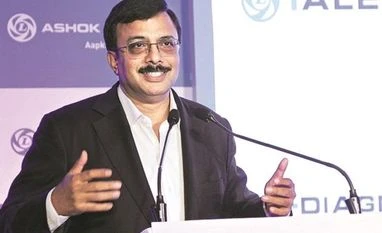MD and CEO Vinod K Dasari has transformed Ashok Leyland from a regional medium and heavy commercial player to one selling a wider range of products across the country. He spoke to T E Narasimhan and Gireesh Babu on how he grew the company’s revenue seven-fold during his tenure. Edited excerpts:
There’s been a slowdown in commercial vehicle (CV) sales in the past few months. Is it a reason for worry?
It is a temporary problem. For the first nine months of FY19, the CV industry has grown 25 per cent, which is very good for any industry. In December, we had a 20 per cent decline but it was 25 per cent higher than in November. Sales were lower, because in January 2018 new regulations relating to blowers and air-conditioners were announced, so there was a huge pre-buy last December.
In the same period, our sales are up 25 per cent. I continue to remain bullish. In the beginning of the year we said the market will grow by 10-15 per cent. I still feel the market will grow 15-20 per cent, even if Q4 is lower than last year.
Will pre-buy ahead of Euro-VI push the numbers for 2019-20? How is Ashok Leyland gearing up?
I am more excited about next year, as it will be the year before Euro VI comes into force. The world over, pre-buy usually increases sales by 25-50 per cent. So, taking a conservative approach, you would still have 25-30 per cent growth next year.
We will invest around Rs 100 crore to increase capacity just to meet this demand. Knowing that the year after there could be a downturn, we are still investing in debottlenecking, which will lead to a 10-20 per cent increase in capacity.
You developed new areas to address the cyclicality of CVs. How is this shaping up?
Five years back, nearly 90 per cent of the profit used to be only from trucks, today it is 50 per cent. Not that profit from trucks is coming down — other businesses, including light commercial vehicles, parts, power solution, defence and others have grown.
Is there any opportunity you feel you have missed — for example, in international markets?
It is true that international markets, except West Asia and Bangladesh, did not do as well as we expected. The reason is the lack of offerings, especially light commercial vehicle (LCVs), which accounts for 80 per cent in international markets.
For the international market, the entry point is LCVs, and after acquiring Nissan’s stake in the LCV joint venture, we will have LCV products for the international markets. Besides, from April 2020, Ashok Leyland’s 100 per cent left hand drive (LHD)-compliant (today, less than 10 per cent of its vehicles are LHD compliant) product range — two-tonne to 55 tonnes — will cater to any market from Euro-III to Euro-VI, complying with European crash norms, at half the cost of what is being manufactured in Europe, and it will help penetrate major markets in Europe, Asean and other regions.
Is your mission at Ashok Leyland accomplished?
When I took over, we said we would create a platform to make Ashok Leyland a great company from an average company. The foundations have been laid for products, people and processes which will take it to greater levels.
The revenue was about Rs 4,000 crore 14 years ago and this year it will be over Rs 28,000 crore. A lot of this seven-fold growth has come from new businesses. The company has reported a consistent double-digit operating profit margin for 15 quarters in a row and will do everything, including not going after market share, to maintain the margin.
Today, 40 per cent of our production comes from the north. We have more than 30 per cent market share in Kolkata, more than 20 per cent share in the northeast. We target a 30 per cent share in every place that we are competing.
And in new businesses?
We have created an entrepreneurial culture in the company, and perhaps we need to be even more so in doing start-ups. For example, ServiceMandi did Rs 40 crore in gross transaction value in the last 12 months, and it is valued at Rs 1,000 crore now. For a big company to do such things is difficult, but I was more interested in changing the company’s DNA for this, and we have been largely successful.
Unlock 30+ premium stories daily hand-picked by our editors, across devices on browser and app.
Pick your 5 favourite companies, get a daily email with all news updates on them.
Full access to our intuitive epaper - clip, save, share articles from any device; newspaper archives from 2006.
Preferential invites to Business Standard events.
Curated newsletters on markets, personal finance, policy & politics, start-ups, technology, and more.
)